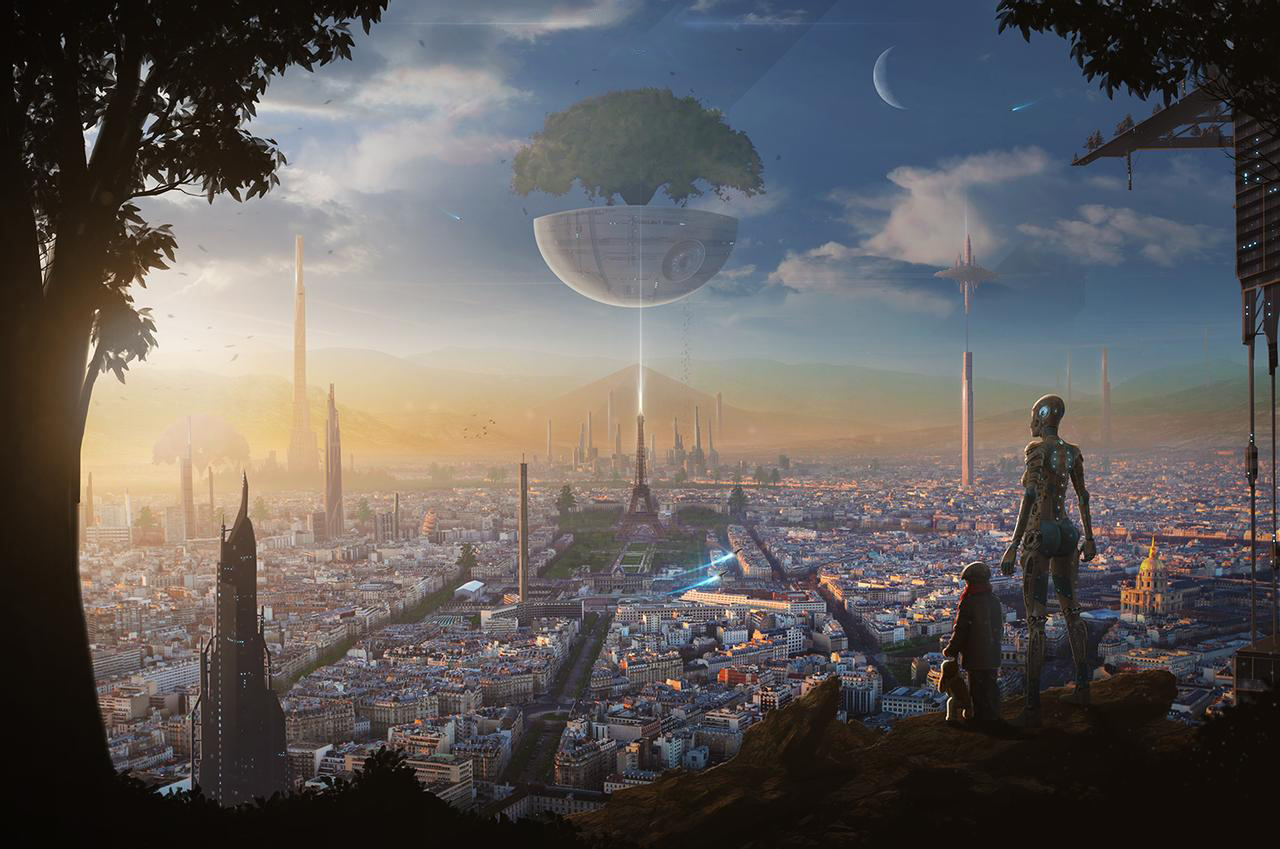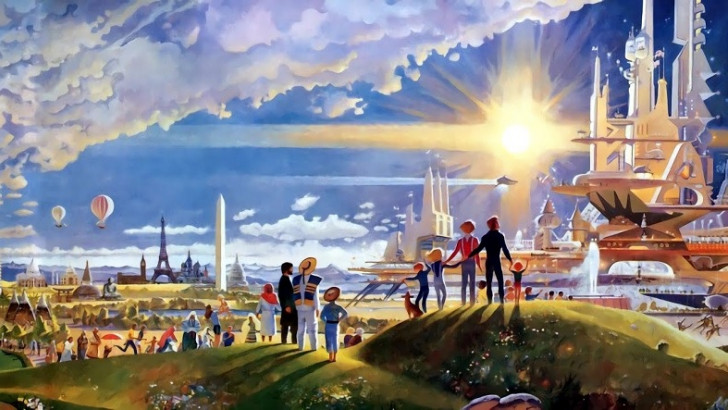Utopia: The Search for an Ideal World
Utopia: A Brief Overview
The word "utopia" comes from the Greek words "ou" (not) and "topos" (place), meaning "no place." It is a fictional place that is perfect in every way. Utopias are often used in literature and philosophy to explore the nature of ideal societies.
The first known utopia was written by Plato in his work "The Republic." In this work, Plato describes a society in which people are divided into three classes: the workers, the guardians, and the philosophers. The workers are responsible for providing for the material needs of the society, the guardians are responsible for protecting the society from harm, and the philosophers are responsible for governing the society.
Another famous utopia is Thomas More's "Utopia." In this work, More describes a society in which people live in harmony with nature. There is no private property, everyone works for the common good, and there is no crime or poverty.
Utopias have been used to explore a wide range of topics, including politics, economics, social justice, and religion. They have also been used to criticize the flaws of existing societies.
Types of Utopias
Utopias can be divided into two main types:
- Egalitarian utopias are societies in which everyone is equal. There is no class system, and everyone has the same opportunities.
- Hierarchical utopias are societies in which people are divided into different classes. These classes may be based on wealth, power, or merit.
Utopia in the Real World
Utopias are often seen as unrealistic and unattainable. However, there are some aspects of utopias that have been implemented in the real world. For example, many countries have adopted policies that promote equality and social justice.
Utopias can also be seen as a source of inspiration. They can help us to imagine a better world and to work towards making that world a reality.
Conclusion
Utopias are a fascinating and important part of human culture. They can help us to understand our own society and to imagine a better future.
References
- More, Thomas. "Utopia." Penguin Classics, 2003.
- Plato. "The Republic." Penguin Classics, 2003.
- Kumar, Krishan. "Utopia and Anti-Utopia in Modern Times." Basil Blackwell, 1987.
Utopia: What It Is and How It Is Defined
The word "utopia" comes from the Greek words "ou" (not) and "topos" (place), meaning "no place." It is a fictional place that is perfect in every way. Utopias are often used in literature and philosophy to explore the nature of ideal societies.
The first known utopia was written by Plato in his work "The Republic." In this work, Plato describes a society in which people are divided into three classes: the workers, the guardians, and the philosophers. The workers are responsible for providing for the material needs of the society, the guardians are responsible for protecting the society from harm, and the philosophers are responsible for governing the society.
Another famous utopia is Thomas More's "Utopia." In this work, More describes a society in which people live in harmony with nature. There is no private property, everyone works for the common good, and there is no crime or poverty.
Utopias have been used to explore a wide range of topics, including politics, economics, social justice, and religion. They have also been used to criticize the flaws of existing societies.
Types of Utopias
Utopias can be divided into two main types:
- Egalitarian utopias are societies in which everyone is equal. There is no class system, and everyone has the same opportunities.
- Hierarchical utopias are societies in which people are divided into different classes. These classes may be based on wealth, power, or merit.
Utopia in the Real World
Utopias are often seen as unrealistic and unattainable. However, there are some aspects of utopias that have been implemented in the real world. For example, many countries have adopted policies that promote equality and social justice.
Utopias can also be seen as a source of inspiration. They can help us to imagine a better world and to work towards making that world a reality.
Conclusion
Utopias are a fascinating and important part of human culture. They can help us to understand our own society and to imagine a better future.
Different Perceptions of Utopia
The perception of utopia can vary depending on the individual or group. Some people may see utopia as a place of perfect peace and harmony, while others may see it as a place of technological advancement or social justice. There is no one right or wrong way to perceive utopia, as it is a matter of personal interpretation.
Some common perceptions of utopia include:
- A place of peace and harmony, where there is no war, crime, or poverty.
- A place of technological advancement, where everyone has access to the latest technology and resources.
- A place of social justice, where everyone is treated equally and has the same opportunities.
- A place of environmental sustainability, where people live in harmony with nature.
Utopia in the Arts
Utopias have been depicted in the arts for centuries. Some famous examples include:**
- The Republic by Plato (4th century BC)
- Utopia by Thomas More (16th century)
- Erewhon by Samuel Butler (19th century)
- Brave New World by Aldous Huxley (20th century)
- The Giver by Lois Lowry (20th century)
These works of art explore the possibilities of utopia, as well as the potential challenges and dangers that it may pose.
Conclusion
Utopia is a complex and multifaceted concept. It can be seen as a source of inspiration, a warning, or simply a way to imagine a better world. Utopias can help us to understand our own society and to work towards making that world a reality.

https://www.yenisafak.com/hayat/utopya-hicbir-yer-olmayan-o-iyi-yer-2807464
https://listelist.com/utopya-nedir-cesitleri-nelerdir/
The first example of a utopia is found in Plato's Republic, written in the 4th century BC. In this work, Plato describes a society in which people are divided into three classes: the workers, the guardians, and the philosophers. The workers are responsible for providing for the material needs of the society, the guardians are responsible for protecting the society from harm, and the philosophers are responsible for governing the society.
Plato's utopia is based on the idea of justice. He believes that a just society is one in which everyone is given the opportunity to fulfill their potential. In his utopia, the workers are able to work to their full capacity, the guardians are able to defend the society, and the philosophers are able to govern wisely.
Plato's utopia is a complex and sophisticated work of philosophy. It has been interpreted in many different ways over the centuries. Some people see it as a blueprint for a perfect society, while others see it as a warning about the dangers of totalitarianism.
Other examples of utopias
In addition to Plato's Republic, there are many other examples of utopias in literature and philosophy. Some of the most famous examples include:
- Thomas More's Utopia (1516)
- Francis Bacon's New Atlantis (1627)
- Edward Bellamy's Looking Backward (1888)
- William Morris's News from Nowhere (1890)
- Aldous Huxley's Brave New World (1932)
These works of literature explore the possibilities of utopia, as well as the potential challenges and dangers that it may pose.
The concept of utopia
The concept of utopia is a complex and multifaceted one. It can be seen as a source of inspiration, a warning, or simply a way to imagine a better world. Utopias can help us to understand our own society and to work towards making that world a reality.
Is Utopia Real?
The word "utopia" comes from the Greek words "ou" (not) and "topos" (place), meaning "no place." It is a fictional place that is perfect in every way. Utopias are often used in literature and philosophy to explore the nature of ideal societies.
Is utopia real? This is a question that has been debated for centuries. There are those who believe that utopia is possible, while others believe that it is an unattainable ideal.
Arguments in favor of utopia
There are several arguments in favor of the possibility of utopia. One argument is that technology is constantly advancing, and that one day we may be able to create a society that is free from poverty, crime, and war. Another argument is that human nature is ultimately good, and that we are capable of creating a society that is based on cooperation and compassion.
Arguments against utopia
There are also several arguments against the possibility of utopia. One argument is that human nature is flawed, and that we are always capable of greed, selfishness, and violence. Another argument is that utopia is simply not possible, because it would require a complete change in human behavior.
Conclusion
The question of whether or not utopia is real is a complex one. There are valid arguments on both sides of the issue. Ultimately, it is up to each individual to decide whether or not they believe that utopia is possible.
Utopia as a source of inspiration
Even if utopia is not real, it can still be a source of inspiration. It can help us to imagine a better world, and to work towards making that world a reality. Utopias can also help us to identify the problems with our own society, and to work towards solving those problems.
Utopia as a warning
Utopias can also be a warning. They can show us the dangers of trying to create a perfect society. For example, Plato's Republic is often seen as a warning about the dangers of totalitarianism.


https://www.edebiyatatolyesi.net/ufkunuzu-asacak-6-utopya-kitabi/1908/
https://altyazi.net/a-dan-z-ye-bir-kelime-on-film/utopya/
https://indigodergisi.com/2016/05/yasamak-istedigim-bir-ulke-var-utopya/
https://www.milliyet.com.tr/molatik/diger/utopya-ne-demek-86816






































































